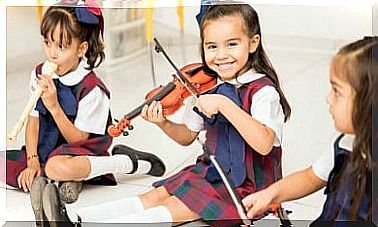Five Things Children Learn From Parents

There are five fundamental things that children learn from their parents at an early age that will permanently define their identity. This is because they learn from imitation, following their example and copying the attitudes of their heroes and role models. That’s exactly what we are to our children.
Imitation takes place unconsciously, and is rooted in the psyche whether we like it or not; therefore, it is important to be clear that if we want our children to be organized, for example, it will not do us any good to say this to them if we ourselves are living in chaos at home.
Next, we’ll talk about some attitudes that children learn from their parents and that in general, no matter how much they change as adults, will remain present in their lives.
Five Things Children Learn From Their Parents
We chose these five things that children learn from their parents to exemplify the power of imitation in our children’s lives. These are organization, having violent attitudes, being positive or negative, love for study and work and being fearful.
1.- The organization
Being organized and also clean is one of the first lessons children learn from an early age. This aspect is so important that even multiple species of animals teach by example hygiene to their offspring, as they instinctively relate it to survival or health.
For us humans, the same thing happens; an organized and clean environment provides health and peace of mind. Children who live in very hygienic and orderly homes are inclined to keep their things tidy without the need for someone to constantly tell them what to do.
Furthermore, they tend to develop an appreciation for their personal objects and those of their colleagues or siblings.

2.- Violent attitudes
No matter what kind of civic and religious values you convey to your children, experts assure you that a significant percentage of individuals who respond aggressively have had negative experiences in their childhood in which they witnessed physical or verbal violence.
We must remember that violence can happen in different ways: children who witness screams at home, hear insults, complaints, hateful ideas or racial offenses, etc. All of them are likely to respond unconsciously and aggressively when they are in stressful situations.
Unfortunately, in cases of domestic violence, many women report that they regard physical or verbal abuse by their partner as “normal”, as they claim that they saw that their fathers treated their mothers in this way and therefore believe that love is manifested through this behavioral duality.
3.- Be positive or negative
Many children between 4 and 7 years of age report feeling unhappy or suffering from depression. Without entering the field of psychology and understanding that there are particular pathologies, it was determined that many children, through analysis with a specialist, repeat statements and behaviors that they see in their father or mother.
No wonder that all the recommendations for good mental health indicate that we should be positive and transmit self-acceptance phrases to our children. Phrases such as: “We are unhappy”, “we are in a bad situation”, “we are not well” or “we will never get better” make a child become an insecure adult, with no self-esteem and depressive behavior.
4.- Love for work and study
The recipe for success in life is a love of study and work, and of course, the antithesis is laziness. When children listen to their parents talk about how fun it is to make an easy living, doing traps or see them wandering around the house, it will surely be harder for them to face the responsibilities of adult life.
The same happens with studies and reading. When children see their parents reading newspapers and books, they will feel the need to imitate them and will ask them to buy them something to read too. On the other hand, in homes where they watch television every day, children tend to take passive attitudes towards learning, and even grades tend to be lower.

5.- be afraid
Often, nervousness and overprotection with our children make us inject in their character doses of insecurity and fear. If we always warn about dangers or possible problems, it is likely that our children, as adults, feel exposed to any situation in life.
Our actions may have the best intentions, appear unconsciously, or appear unnoticeable to our children, but often this is not the case. So we must be careful and think that many of our children’s attitudes will be based on what they see at home, since it has been proven that children learn a lot from their parents.









